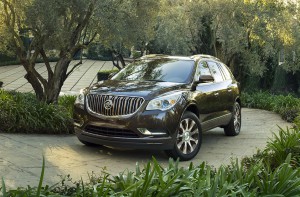
Owners of the 2016 Chevrolet Traverse are getting debit cards as compensation because the company incorrectly stated the vehicle's fuel economy rating.
After a short round of speculation, General Motors confirmed it is compensating owners of its 2016 family of large crossover models for the difference between misstated fuel economy numbers and the actual figures.
The company overstated the fuel economy rating on 1 to 2 mpg depending upon how the vehicle is configured. How much is being paid out is dependent upon a few variables, primarily if the vehicle leased or purchased.
Leasing customers will be offered the debit cards. The cards will carry a value of between $450 and $900, depending on whether the vehicle is front-wheel drive or all-wheel drive and the terms of a lease. The reimbursement also factors in the EPA formula that assumes a fuel price of $3 per gallon and 15,000 miles of annual driving for five years.
For those owning or leasing one of the three models, GM is offering either a debit card valued at several hundred dollars, or a 48-month/60,000-mile protection plan. The protection plan option is designed for high-mileage customers and those who plan to keep their vehicle for an extended period of time.
GM ordered a stop-sale on the new models until corrected labels could be sent to dealers, which happened during the weekend, and they could replace the stickers. The automaker has sold about 170,000 units of the affected vehicles already.
Of that number, 130,000 were sold to everyday customers and the remainder were sold to rental car, commercial and fleet buyers.

GM is compensating owners and lessees of their 2016 Buick Enclave for misstated fuel economy ratings.
(Click Here for details about the class action suit filed against GM over mileage inaccuracies.)
GM said in a statement the mileage overstatement was the result of improper calculations. It said the inclusion of new emissions-related hardware in the 2016 Chevrolet Traverse, GMC Acadia and Buick Enclave SUVs required new emissions testing, but the fuel economy data from these tests were not captured in calculations made for EPA fuel economy labels. The error was discovered as GM engineers worked on the 2017 model year labels, Reuters reported.
General Motors has been hit with a proposed class action lawsuit over changes to its fuel economy calculations for three different vehicles as questions about its mileage claims continue to grow to nearly 2 million vehicles.
(GM halts sales of large crossovers to correct mileage numbers. For more, Click Here.)
The expansion comes, in part, as Consumer Reports magazine suggests that the automaker has been incorrectly stating the mileage in these vehicles for several years.
Incorrect mileage data has been in the news lately, as Mitsubishi recently admitted to selling vehicles in Japan with the falsified mileage reports. Volkswagen’s diesel scandal also involved faulty mileage ratings for those vehicles.
(To see about automakers under fire for bending the truth, Click Here.)
However, it is not a recent anomaly. In 2014, Hyundai Motors and Kia Motors paid penalties of $350 million related to overstating ratings on 1.2 million vehicles in the U.S. Additionally, Ford restated the fuel economy ratings on six vehicles after it was discovered that they were inflated. The Dearborn, Michigan-based automaker reimbursed owners of the vehicles.
